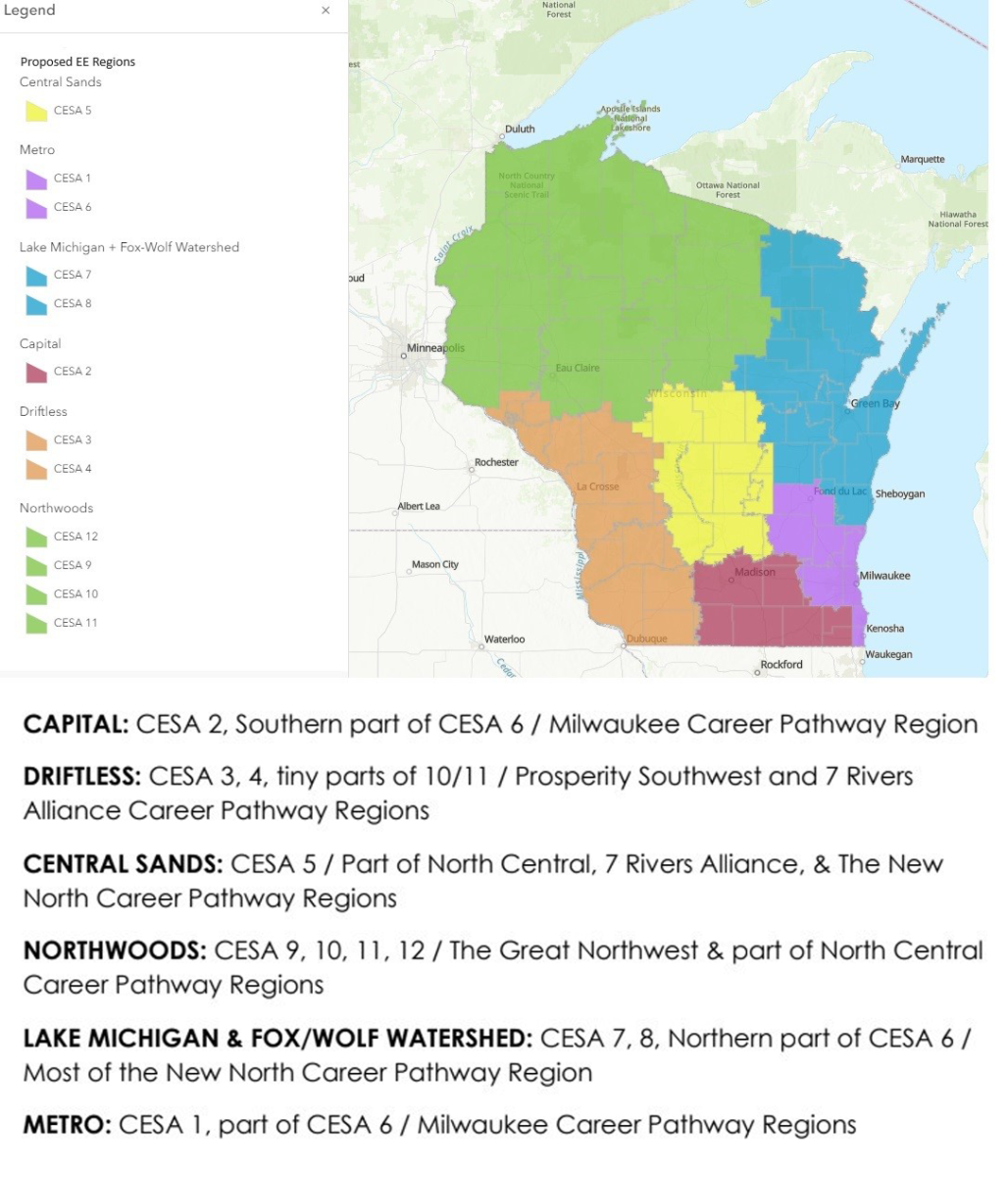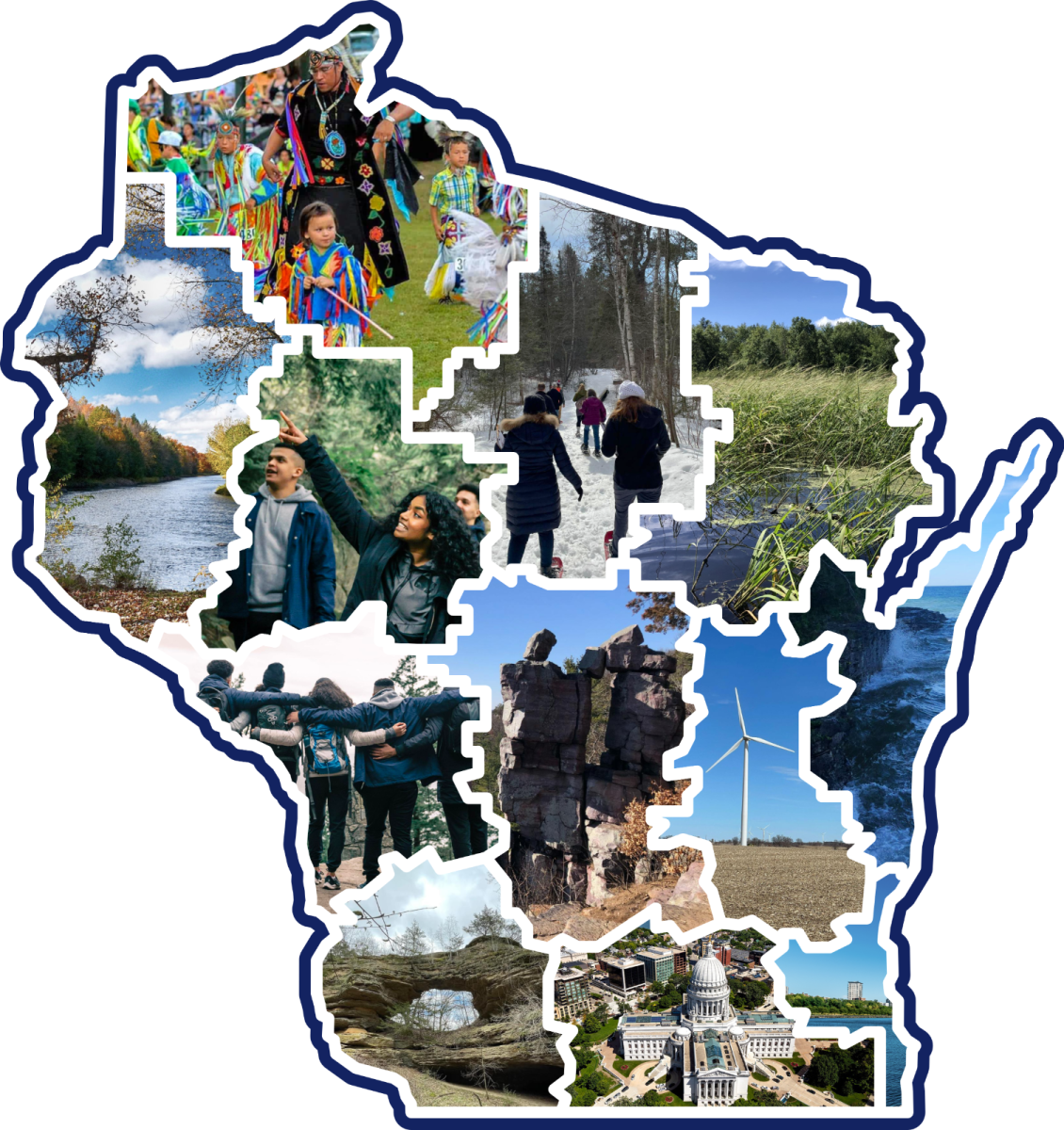Leaders in Environmental Education
Fellowships to develop regional leadership are being offered to increase capacity for effective environmental education in PK-12 schools. Another goal of the fellowship is to foster a collaborative relationship between the Department of Public Instruction and educators in the field, benefiting both through shared learning, advocacy, and leadership opportunities.
Fellowships are awarded through an application process and educators are contracted for a defined amount of time, however, may remain active in the larger network beyond their contract on volunteer basis so long as they are actively working in an educational role within a school district or in a role directly supporting public education outside of a school district. This includes roles such as: teachers, instructional coaches, effectiveness coaches, central office and/or building administrators, and CESA consultants.
This network serves as a inspirational and advisory body, working to use member expertise and efforts to elevate the field of public education for all students, teachers, administrators, families, and communities.
Current Fellowships
Regional Leader Fellowship (2024-25)
The Regional Leader Fellowship is anticipated to begin October 2024 and run through August 2025. The Regional Leader Fellowship program, coordinated by the Department of Public Instruction, will build capacity for local, place-based outdoor and environmental education to reduce environmental impact and improve health and wellness in Wisconsin PK-12 schools, and increase environmental literacy and sustainability to increase nature connection and take action to address climate change.
Regional Leader fellows represent six different geographic regions of Wisconsin (covering all CESAs) and will engage in professional learning, develop local partnerships, serve as regional contacts, and plan and implement a regional event that supports the goals of Green & Healthy Schools Wisconsin: reducing environmental impact, improving health and wellness, and increasing environmental literacy.
We encourage applications from individuals in communities that have been historically marginalized or excluded from environmental education or access to nature.
Regional Leaders fellows will:
- Participate in one monthly 90-minute virtual meeting
- Submit the Green & Healthy Schools survey for your school (or a partner school)
- Plan and host event with regional partner
- Attend Green & Healthy Schools webinar series as possible
Here’s what Regional Leader EE Fellows can expect:
- Contract for Services ($1,000) from October 2024 - August 2025
- Regional event funding (anticipated amount up to $2,000, final amount TBD)
- 1-year membership ($40 value) to the Wisconsin Association for Environmental Education, including free access to WAEE’s online courses and standard member benefits such as discounts on outdoor gear and more
- Feature on the Green & Healthy Schools website, newsletter and social media
- Training and support to develop skills that will enhance your résumé
- Opportunities to collaborate with professionals in a wide network (priceless)
- Access to participation in additional grant opportunities (priceless)
Please know that as a fellow, we are here to support you throughout each step of the fellowship and we remain open and flexible to your needs.
Application deadline is August 31st. Apply here: https://forms.gle/iyUoiQdxTJJzPTGU6
If you have any questions regarding the fellowship, please email Victoria Rydberg-Nania at victoria.rydberg-nania@dpi.wi.gov
Frequently Asked Questions
-
What will we do during monthly meetings?
Each month, the fellowship cohort will meet online. The first half of the meeting (roughly 45 minutes) participants will engage in small group discussion and presentations from experts across the state to learn about resources, opportunities, trends, and needs in Wisconsin related to environmental education, health and wellness, and reducing environmental impact. The second half of the meeting will be focused on planning regional events and much of the time will be spent in breakout rooms with a regional partner to facilitate time and space for collaborative planning. The goal is by the end of the series, Fellows feel equipped to connect local educators with statewide resources and host an educator event in their region. -
What are the expectations for the Green & Healthy Schools webinar series?
Green & Healthy Schools in Action webinar series will provide Fellows with in-depth information, stories, and resources for each of the Green & Healthy Schools focus areas (community engagement, body and mind, building health, energy, environmental education, school grounds, transportation, waste, and water). The content will help the fellows advance green and healthy efforts at their own school (or partner school) as well as provide background to help them act as an ambassador for Green & Healthy Schools Wisconsin. These webinars will be offered monthly on Mondays or Thursdays from 4:00 - 5:00 p.m. each month during the school year. The main parts of these webinars will be recorded. Fellows are encouraged to attend, but not required. Visit the Green & Healthy Schools website for a complete list of dates and topics. -
What type of support will I receive to host an event?
The second half of each monthly meeting will be focused on planning regional events. You will work with another Fellow from your region on a collaborative event. You will hear from past event planners, be provided a toolkit and templates to plan your event, and get support from DPI and DNR Green & Healthy Schools staff throughout the process to help with planning, technology needs, marketing, and more. -
What is the application review process, selection criteria, and timeline for notification?
Classroom educators are encouraged to apply, however, this fellowship is not limited to educators. If you have a passion for environmental education and capacity to take on this role, we encourage you to apply! We encourage applications from individuals in communities that have been historically marginalized or excluded from environmental education or access to nature. The
goal of this fellowship structure is to establish two fellows in each identified region (see map below) so location will be considered in reviewing applicants. Applications will be reviewed in early September and Fellows will be notified by September 16. The fellowship will begin in October, or as soon as all paperwork is completed.

-
What are the reporting and evaluation requirements?
Each region will be asked to provide metrics about their event. In adddition, fellows will participate in a final reflection session and complete a feedback survey. -
What are the specific outcomes for this fellowship?
- Establish six regional hubs to support environmental education with two educators and an organization to serve as local contacts
- Develop leadership skills and increase knowledge about environmental education resources
- Increase PK-12 environmental education efforts through hosting six regional educator events to advance locally-relevant Green & Healthy Schools goals
Past Fellowships
Teach Wisconsin Climate Network Fellowship (2024)
The Teach Wisconsin Climate Network Fellowship program is coordinated by the Department of Public Instruction and the Wisconsin Center for Environmental Education to facilitate high quality professional development to make it easier for Wisconsin educators of all grade levels and subjects to teach about climate change so their students will have access to powerful climate education throughout their lives. Training will be provided by our non-profit partner, SubjectToClimate.
With this fellowship, we aim to provide professional development to increase knowledge about climate change and make educators more confident about carrying out climate change education by creating engaging climate change education lesson plans across all grade levels and subjects.
Teach Wisconsin Climate Network fellows represent six different geographic regions of Wisconsin (covering all CESAs) and are current or former classroom teachers with an expertise and interest in climate education. Fellows engage in a “train-the-trainer” model by becoming experts in the newly created Teach Wisconsin Climate resource hub, well versed in the best practices for climate education, and familiar with a broad array of freely available resources from trusted climate education partners.
Background
We know that in order for climate education to be effectively implemented, teachers need to be supported with adequate resources. And we also know that teachers know best what other teachers need.
The Wisconsin Climate Education Hub was created to provide educators with quick, easy access to high-quality instructional resources to support the state’s requirement for environmental education while advancing the opportunity for educators to incorporate climate change lesson plans into already existing curriculum.
With the official launch of the Wisconsin Climate Education Hub, there is a need for educators to access place-based lessons created by other Wisconsin educators in the “Exemplar Lesson Plan” section. This is a section where educators from Wisconsin can share lessons across all grade levels and subjects that are especially relevant to Wisconsin educators.
We know teachers are leaders for climate education. Teach Wisconsin Climate Network Fellowship will work at the heart of what we do: build exemplary lesson plans by teachers, for teachers.
Teach Wisconsin Climate Network Fellows will:
January - March:
Complete 20 hours of climate education and lesson design training (asynchronous and synchronous)
March - May:
Publish two instructional plans for climate education in your setting (remote)
July:
Attend Wisconsin cohort day for Summer Institute on Climate Education (virtual) and share instructional plan
June - September:
Conduct 1-hour of teacher training (virtual or in-person)
Specific dates (Live, synchronous meetings are in bold):
-
Jan 16 - Feb 12: Asynchronous Training Modules
-
Level 0: Understanding Climate Change (3-4 hours)
-
Level 1: Teaching About Climate Change (5-6 hours)
-
Level 2 Modules 1- 7 (2 hours)
-
-
Feb 12 - 14: Meet with assigned Grade-Band Coordinator (support person for lesson plan) to reflect on Level 0 + 1 (0.5 hours)
-
Feb 15 • 4-5:30 PM CT: Day 1: Brainstorming Workshop Synchronous Remote Training (1.5 hours)
-
Feb 12-19: Complete Level 2 Module 8 (2 hours)
-
Feb 22 • 4-5:30 PM CT: Day 2: Lesson Writing Workshop Synchronous Remote Training (1.5 hours)
-
Feb 19-26: Complete Level 2 Module 9 (2 hours)
-
Feb 29 • 4-5:30 PM CT: Day 3: Accompanying Materials Workshop Synchronous Remote Training (1.5 hours)
-
Feb 26-Mar 4: Complete Level 2 Module 10 (2 hours)
-
Mar 7 • 4-5:30 PM CT: Day 4: Review Workshop Synchronous Remote Training (1.5 hours)
-
Mar - May: Publish two lesson plans on the Wisconsin Climate Education Hub
-
July 15-17: Summer Institute on Climate Change Education, Wisconsin Cohort Day tentatively July 17
-
June - September: Offer 1-hour training for 30 educators
-
September 15: Invoices due to DPI
Here’s what Teach Wisconsin Climate Network Fellows can expect:
-
Contract for Services ($1,000)
-
1-year membership ($40 value) to the Wisconsin Association for Environmental Education, including free access to WAEE’s online courses and standard member benefits such as discounts on outdoor gear and more
-
Training and support to develop skills that will enhance your resume
-
Opportunities to collaborate with professionals in a wide network (priceless)
-
Access to participation in additional grant opportunities (priceless)
This application is closed.
